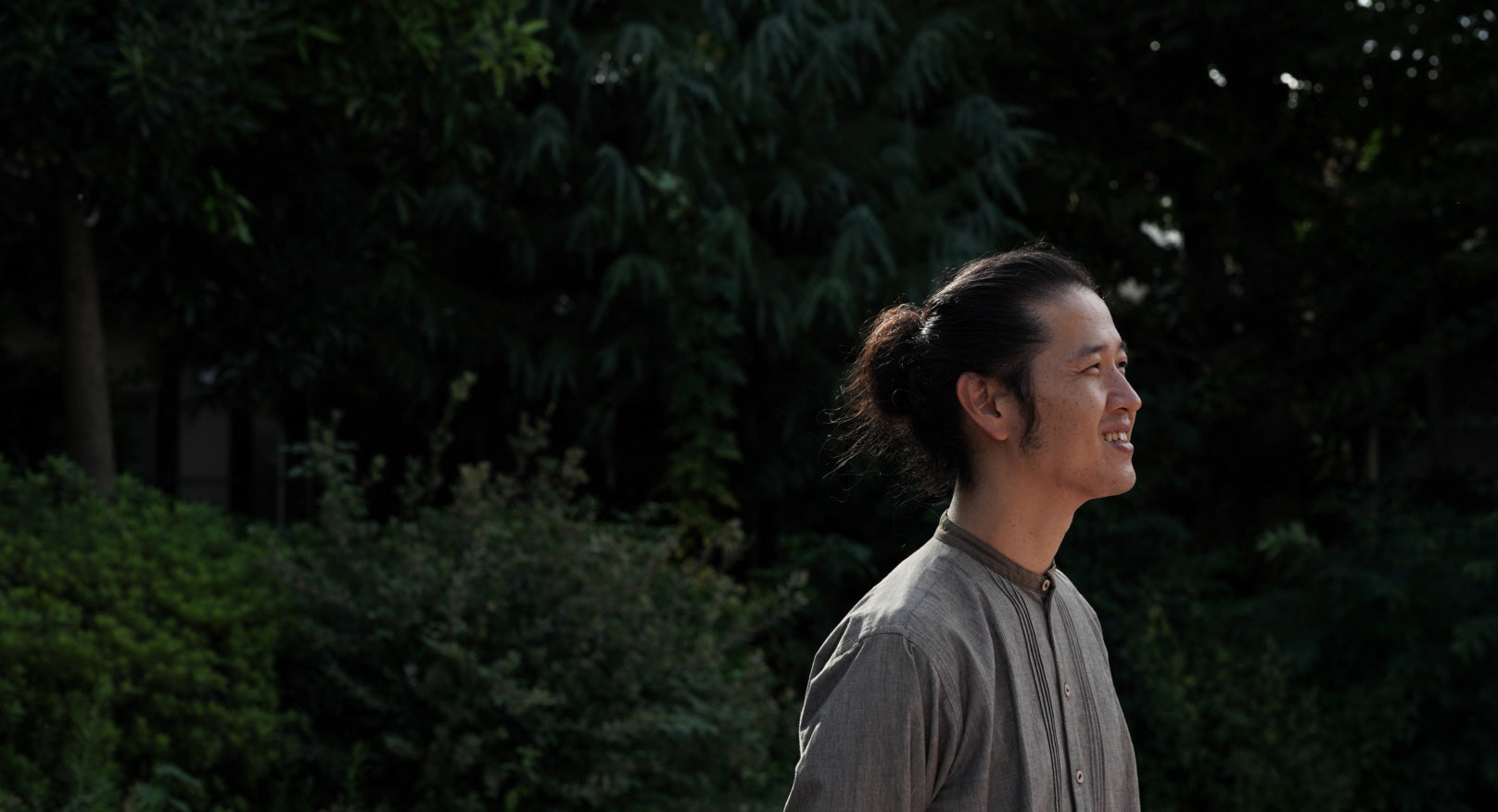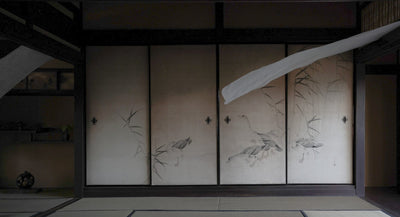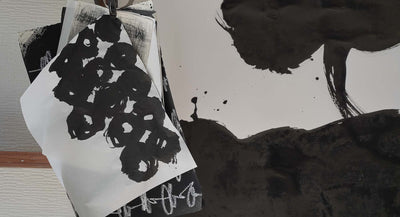目に見えるものばかりを追いかける現代社会で
目には見えないこころへの処方箋をあなたに
自然が持つ、生み出す力を携えて
僕らは響きあう命と共鳴する
— 医療の軸を東洋医学としたきっかけは何があったのでしょうか。
この場所「つゆくさ医院」を立ち上げたきっかけにも繋がるのですが、元々僕は救急医療の現場にいました。応急処置として患者さんの手当をする際に鎮痛薬を処方しても、症状を一時的に止めているだけで病そのものは改善していないんですね。救急医療で必要とされる対症療法と、医療本来の在り方を模索する中で、病気や身体の不健康を根元から治すためには食養生につながる漢方治療を中心とするべきだという考えに至りました。漢方がすごいなと思うのは葛根湯なんかは2000年前から存在する薬です。科学で調べても最近になってやっとその成分の一部が解明されたばかりでまだ未知数なことばかり。
漢方薬を本格的に使い始めた当時は腫瘍ワクチンの研究をしていたのですが、客観的な数値として効果を検証をすることも大切ですが、僕はデータになっていない自然界の法則を伝えることに力を注ぎたいと思うようになっていきました。そして漢方治療によって、西洋薬では解決できない不調からの劇的な改善を次々と目の当たりにする実体験を経て、漢方への興味がさらに深まっていきました。
医学の中にも「サイエンス」と「アート」という考え方があります。サイエンスとは物質的で科学的な「見えるもの」のことで、アートとは心や気という「見えないもの」のことです。西洋医学は「見えないもの」以外は存在しないというスタンスの医学ですが、東洋医学では「見えないもの(陰)」の方が圧倒的に多いと考えます。実際の世の中は、人間には「まだ見えていないもの」の方が圧倒的に多いですよね。医療における「まだ見えていない」部分、つまりアートの部分に僕はもっと比重を置きたい。健康とは何か、病とは何か。治療以前の根本的な部分に僕自身はフォーカスしたいんですよね。それはEvidenceBasedMedicine(証拠に基づいた医学)といった西洋医学の方法論では、限界が見えてきてしまったというのが、東洋医学に傾倒し始めた理由です。

— 自然に寄り添って生きることは理にかなっていることかもしれませんね。精神的にも肉体的にも健康というのは具体的にはどのような状態と考えますか。
「健康」というのは、自分自身に起こった心身の不調を自分自身で改善できる状態のことです。からだもこころも、自分自身に起こった「症状」というシグナルを早い段階で認知して、それを修正する手段を意識的なり、無意識的になり持ち合わせている状態が「健康」という状態です。つまり「自己修復力」が「健康力」となるのですが、漢方薬というのは健康力を向上させるのにとても有用です。だからこそ根本治療になると僕は考えています。例えば頭痛に対してケミカルな鎮痛薬を使っても、その原因がどの生活にあったのかわかりませんよね。ところが漢方治療では効果のあった漢方薬の種類によって、その原因となっている生活がわかるので、同じ失敗を繰り返さないようになり、健康力が上がっていくんです。
— なるほど。東洋思想では「中庸」という考えをよく聞きますが、健康という側面でも「中庸」であるということは重要なのでしょうか。
そうですね。免疫力とひと言で言っても、免疫力は強すぎるとアレルギーや膠原病(自分自身の細胞を免疫細胞が攻撃してしまう病:リウマチなど)になってしまい、弱すぎるとガンや肺炎などになってしまいます。こころの面でも、不安や抑うつといった感情は強すぎても弱すぎても人間は生きていけません。クリシュナムルティという思想家の『既知からの自由』という本にも書いてありますが、既に知っていることから自由になる。これが正しいと思い込んでいる固定された観念があると恐怖や怒りが生まれます。僕自身はハイブリットであることが非常に大事だと感じていて、医学でも西洋医学だけ見ていたら違いがわからないわけです。西洋医学と東洋医学、自然と科学、陰と陽など2つの指標があると自分の中でバランスが取りやすくなります。何でも中庸は大切なことだと思います。
— 先ほど「医学の中にもサイエンスとアートという考え方がある」とおっしゃいました。自然であることや健康であることと、例えばアートの価値の1つである「美しさ」には関連性があると思いますか。
美しさとは「自然法則に共鳴しているもの」だと考えています。芸術作品というのは自然法則の中のある部分をトリミングして別の空間に提示することでその美しさが認識される行為だと思っていて。例えば日の出や夕焼けを見て美しいと思ったり、焚き火の火が揺れている様子をずっと眺めていたくなるような。アーティストのオノ・ヨーコは“空よりも美しい芸術はない”と語っていたり。このように芸術に触れ、自然や宇宙の法則を感じることで、その先にあるものを自覚していく。美しさを医療で考えた時も、化学的なものは即効性があるので効果が高いかもしれませんが、あくまで人工的なものなので、ずっと化学的なものだけを使い続けていると自然法則の中からは崩れ落ちてしまう。そこで美しさはなくなってしまう。健康と美しさは密接に関わり合っていて、健康になっていくと人は美しくなっていきます。医療自体の美しさ、それは「楽しさ」ということもできると思いますが、そういうことも重要だと思います。それは外科手術とか、西洋医学にも通ずることですね。

— 面白いですね。人間も自然の一部。そう考えると、人間は美しさを頼りに健康に近づいていくとも言えますね。
例えば音というのは発生すると永遠にその影響は残っていく。発生するものに敬意を払うとでも言うのでしょうか。茶道で言えば所作も同じだと思います。一つ一つの動作に責任を持つようなイメージです。世界の物質をバランス良く整えていくことが大切だと思います。芸術は触れる触れないではなく常に“在るもの”。周りを滑らかな環境に整えていくために、美しいものを意識していくことは大切だと感じます。作品と言うよりは生き方自体を芸術的視点で見ていくような感覚です。
— 先生が音楽を作る時の感覚にも近いのではないでしょうか?作曲をする際のインスピレーションはどこから得るのでしょうか。
僕は陰陽トロピーという思想を中心に考えているので、インスピレーションは「目的」によって弱まると考えています。だから、特に音楽をつくるときには、なるべく「目的」を持たないように努めています。シンプルですが目の前にあるものに集中して音を出す。僕は演奏家ではないので、音を出したらコンポーズしていく。インスピレーションのようなある種の霊的なものを音にするまで、自分はとにかく「器」になるようにしています。なるべく自我を無くして器のように様々な事象を受け止める。
— 「器」。先ほどおっしゃっていた「バランス良く整えていく」ためには必要な過程なのですね。音を出したくなる、作曲をしたくなる瞬間はありますか。
僕の場合は自分が無になって器になって出した音を、次は意識的に解釈し直すのが好きなんです。作曲家の時は作曲家をやりきって、医者として活動している時など別の立場で自分の曲を聴きます。作曲家ではない時間に曲を聴くことで、その時に印象に残った部分から次の創作のインスピレーションが生まれます。大学にいた頃は、現実世界から抜け出して美しい場所に行きたいという欲求があったので、エネルギーのままに取り組んでいましたが、今は無理せず自然発生した時に曲を作るようになりました。
— 質問が前後しますが、ご著書『からだとこころの環境』では「脳の陰性化」のために「呼吸のような音楽」や「流すことで静寂が得られる音楽」としてアンビエントミュージックを薦めていらっしゃいます。そしてご自身で作曲しているのもアンビエントミュージックですね。
最近はアンビエントミュージックを聴く方も増えたと思いますが、僕はある種の「防衛」だと思っています。例えば日常にありふれた機械音は少なからず人々のストレスになっているはずなんです。元々は自然の音に囲まれて人類は暮らしてきたわけですが、便利な世の中になる一方で、本来は存在しなかった人工的な機械音、例えばモーター音のような一定の音が鳴っていると人間はストレスを感じます。僕自身も人工的な音に包まれた環境の中で静寂を得たいという欲求から音楽をつくっていました。アンビエント・ミュージックは騒音に対する防衛、あるいは逃避行為として、産業革命の頃から発生してきたと考えています。なので、現代社会のバランスをとる意味で自然発生的なアンビエントミュージックがあると思うんですよね。
— 今後の取り組みとして音楽と医療をさらに繋げたい思いはあるのでしょうか。
日本人は病院やレストランなどの音環境に対する意識が、西洋人に比べて低いと言われています。そこを調整したいですかね。まぁ、日本人というよりアジア人は全般的に音に対する配慮が弱いと感じます。元々日本人は右脳と左脳の使い方がポリネシア系の人たちと違うと言われていて日本語は擬音語がすごく多いです。日本語自体に母音が含まれていることが影響しているのですが、音に意味を感じることができる国民だと言われています。例えば「閑さや岩にしみ入る蝉の声」という松尾芭蕉の句がありますが、あの感性は日本人独特だと言われています。ただ現代社会では自然の音がどんどん聞こえなくなってきていることで、日本人的な感性が鈍っているのだと思っています。ホテルやレストランへ行くとサービスや内装は素晴らしいと感じる一方で、音に対する配慮が驚くほどできていないところが多いなと。
— この音は合っていないという違和感はどこで感じるのでしょうか。
病院やレストランという不特定の人が来る場では、耳障りなものに対して感じますね。耳障りというのは、侵襲してくる音に対して感じます。主義主張、目的のある音と言えば良いでしょうか。僕が禅の思想で最も好きなのが「妨害なき相互浸透」という仏教学者の鈴木大拙氏が唱えた考え方です。禅は自らのスペースで行うものであり、他者を妨害してはいけない。その考え方が禅とアンビエントミュージックの最も共通するテーマだと思っています。4月に東京の白金にあるPottariというギャラリーで陶芸家と展示をするのですが、3つのサウンドシステムを使った構成を考えています。それぞれの音楽はお互いの音楽を妨害せず、その場の音の出会いが一期一会を演出するインスタレーションを予定しています。
— 非常に興味深いですね。禅の話がでましたが、医院のコンセプトに茶の湯のエッセンスがあります。茶の湯のどこに魅力を感じますか。
茶道に関しては詳しくないのですが、中国から伝来したものが、日本独自の発展をして日本の文化となったことにとても興味を持っています。漢方薬もお茶ですからね。「つゆくさ医院」の名前は露地草庵から来ています。この診察室は千利休がしつらえた二畳の茶室「待庵」からもインスピレーションを受けています。
僕はアンビエントにしても漢方としてのお茶にしても、意図せず繋がりを持つことが多いです。基本的に何に対しても目的を持たないようにしていて。目的を持たない方が変に歪曲していかない。今、目の前にあるものに対して純粋な気持ちでに全力で取り組むことができます。その結果として音楽があったり医院があったり。ただ、医療でも漢方でも音楽でも、総じて自然との関わり、つまりはピュシスが持つ「生み出す力」をもっと見つめていきたいところは一貫しています。僕が携わるどの分野においても、自然が持つ生み出す力に敬意を払いながら僕なりのやり方で提示していきたいです。
— 東洋と西洋、自然と科学。先生の中では陰陽太極図のように全てが繋がって存在し、二項対立に捉えるのではなく、両極を知ることで「調和」を保ち、そのさきに心身ともに健康なよりよく生きる人の在り方を感じます。つゆくさ医院は医療の新しいカタチを提示していますが今後の活動も楽しみです。
<コメント>
このアルバムは僕のOpitopeというユニットのレコード会社からリリースされた音楽で、僕の人生を変えたアルバムでもあります。アンビエント・ミュージックの定義はいろいろありますが、呼吸のように意識しなければ気にならず、意識すれば美しさを感じられる環境としてあれる音楽、音を流すことによって静寂をもたらす音楽だと、僕は考えています。勉強や就寝前など、美しい静寂の時間を得たい方は流してみてください。
— What made you decide to focus to Oriental medicine?
Well, it’s related to why I established Tsuyukusa Clinic. I used to work as an emergency physician. During this time, I would prescribe patients with analgesics when I treated them for first aid. However, analgesics would only temporarily control their symptoms and not provide them with a cure. As I continued to explore various symptomatic treatments that are required in emergency medicine as well as how medical treatment should originally be, I concluded that I would shift my focus to herbal medicine, which is a study that is deeply linked to curing illnesses and poor physical health through balanced diets. What I find amazing about herbal medicine is, for example, kakkonto has been around as medicine for over 2000 years. However, only certain components of the medicine have been revealed to this day.
Around the time I had genuinely begun handling herbal medicines, I had been conducting research on tumor vaccines. Although it is important to inspect medical effects through objective values, I had begun to shift my focus on conveying merits through the law of nature, a factor that simply cannot be converted into data. Furthermore, my interest in herbal medicine grew deeper after I witnessed several cases where patients had shown dramatic improvement from disorders that could not be cured by Western medicine.
Even within the medical science field, there are contrasting ideas. For example, there are practitioners that are in pursuit of a science-based approach which focuses on physical aspects that can be perceived visually. On the other hand, there are practitioners that are in pursuit of an art-based approach which focuses on aspects such as the mind and spirit which are factors that cannot be perceived visually. With that in mind, Western medicine is a medical concept which firmly considers what can be perceived visually as absolute while Oriental medicine acknowledges what cannot be seen. In the actual world, there is an overwhelmingly vast number of factors that cannot be perceived visually. Understanding this, I want to focus on what is yet to be seen in the medical field. In other words, I am more interested in the art-based approach. I want to set my sight on the fundamental factors that come before medical treatment. There is a limit to how much Western medicine, which is mainly evidence-based, can achieve. This is why I started to shift my focus on Oriental medicine.
— It makes sense to live our lives based on natural components. What exactly is being healthy both spiritually and physically?
Being healthy is being capable of recovering from spiritual and physical disorders by yourself. Having a means to detect and fix symptoms at an early stage both consciously and subconsciously is what defines being healthy. In other words, a person’s natural healing power leads to vitality, and I believe herbal medicine is highly effective in improving vitality. Therefore, I regard herbal medicine as a form of fundamental treatment. For example, if chemical sedatives are used to cure headaches, you wouldn’t be able to find from what part of your lifestyle the symptoms developed. However, through the use of herbal medicine, you can discover how the symptoms developed in a person’s lifestyle by observing which medicine was effective. This will prevent the person from repeating the same mistakes and lead to improving one’s vitality.
— I see. Moderation is a notion that is prominent in Oriental philosophy. Is moderation a crucial factor in health?
Yes, it definitely is. For example, if a person’s immunity is too strong, the person risks contracting allergies and connective tissue diseases (illnesses such as rheumatism, etc., where a person’s immune cells attack their own cells). If a person’s immunity is too weak, the person risks contracting cancer and pneumonia. This also applies spiritually. A person cannot live if emotions such as anxiety and depression are too strong or too weak. There is a book by the philosopher Jiddu Krishnamurti called Freedom from the Known. In it, he explains how we can free ourselves from what is expected. Being constricted to believing a fixed idea is true generates fear and anger. I believe that it is crucial to have a hybridized point of view. In medical science, it is impossible to discover differences through Western medicine alone. Having bidirectional indicators such as Western medicine and Oriental medicine, nature and science, as well as yin and yang helps me maintain my composure. I believe moderation is important in any aspect.
— You had spoken about how there are science-based and art-based approaches in medical science. Do you believe that there is a connection between beauty, which is an important value in art, and being natural and healthy?
I believe beauty is something that resonates with the law of nature. To me, creating works of art involves trimming segments discovered in nature and presenting them in separate spaces where the works can then be recognized as beautiful. It is similar to how we acknowledge the view of sunrises and sunsets as beautiful, and how we can continue watching the flickering flames of a bonfire for extended periods of time. The artist Yoko Ono even claims that there is no art piece that is more beautiful than the sky. In this way, by being exposed to art and sensing the laws of nature as well as the universe, we become capable of acknowledging what exists beyond these aspects. For example, one would break away from the laws of nature if chemical treatments are applied regularly, even though chemical medicines can provide immediate relief. This, I believe, is where the sense of beauty dissolves. Health and beauty are closely related, and people become more beautiful as they become healthier. Personally, the beauty of medical treatment can be considered as something that is enjoyable, and I believe this kind of concept is crucial as well. This is a factor that also applies to surgical operations and Western medicine.
— Very interesting. Considering the fact that human beings are also a part of nature, we can say that people draw closer to health while relying on beauty.
For example, if sound is emitted, its effect remains forever. I guess you can say it is kind of like paying respect to what is generated. I think it is similar to the conduct involved in tea ceremonies where both host and guest infuse a sense of commitment in every action. I believe it is crucial to maintain the balance between various substances in our universe. Art is not just something to experience. It is an element that invariably exists. I believe it is important to be conscious of beautiful things in life to maintain a mellow environment. Rather than the art pieces themselves, it is sort of like living your daily life in an art-based perspective.
— Is it quite like how you create your music? What are some things you are inspired by when you compose?
My philosophy is focused on a yin and yang ideology, and I believe that my inspiration will become weaker if I have an objective. Therefore, I try my best not to have a concrete goal when I create music. My method is quite simple. I play by simply concentrating on what I have in front of me. Since I don’t consider myself a musician, I compose my music after I start playing. I concentrate on becoming a vessel until I am capable of expressing my sounds through spiritual factors such as inspiration. Ignoring my ego as much as possible, I welcome and accept various phenomena that occur as I play.
— So, becoming a vessel is a crucial process to maintain an ideal balance for you. Do you have moments that motivate you to play or compose music?
In my case, I enjoy consciously reinterpreting sounds I emit while acting as a vessel in a subconscious state. As a composer, I would create my music as one, and then I would listen to my own music from the perspective of a non-musician during my activities as a doctor. Listening to music while I am not playing the role of a composer enables me to gather creative inspiration from each impactful momentary segment. While I was in school, I had always wanted to escape from the real world and drift off to a beautiful place, so I would direct that energy into my compositions. Now, I only create music when inspiration comes to me naturally.
— In your book Environment of the Body and Spirit, you have recommended ambient music as a means to achieve negative conversion for the brain. You’ve also stated that ambient music is a medium that is much like breathing as well as a style of music that offers silence simply by listening to it. And you yourself are a composer of ambient music.
Recently, there are more people that listen to ambient music. I feel that it is a genre that can provide a sense of protection to those that listen to it. For example, mechanical noises that we encounter daily are definitely a source of stress for us. Since human beings have originally settled in locations surrounded by natural sounds, while our societies have evolved to become more convenient, man-made machine noise, such as the extended noise emitted from motors, are a source of stress for us. I myself started making music out of my desire for tranquility in environments full of man-made noise. I believe ambient music was established during the industrial revolution as a means of protection or escape. I suppose this is why ambient music, which emerged spontaneously, was created to maintain a sense of balance within our modern society.
— Do you plan on further merging music with medical treatment?
It is said that the Japanese people have a low awareness of their sound environment in locations such as hospitals and restaurants compared to westerners. I’d like to change that. Actually, I feel Asian people generally have a low sense of awareness for sounds. It is understood that Japanese people use their right and left brains differently from people of Polynesian descent. Additionally, the Japanese language has a massive number of onomatopoeias. Though it is mainly because the Japanese language mainly contains vowels, it is said that the Japanese people have the ability to recognize the nuance of sounds. For example, the haiku “Up here, a stillness―― The sound of cicadas seeps into the crags” by Matsuo Basho is considered a sensitivity that is unique to Japan. However, due to the fact that the sounds of nature are becoming more and more inaudible in our modern society, I believe that this Japanese sensitivity is fading. While people are capable of acknowledging remarkable services and interior designs at hotels and restaurants, they have a surprisingly low level of awareness for the sounds that occur around them.
— In what kind of locations do you sense that certain sounds are out of place?
At locations such as hospitals and restaurants, where unspecified numbers of people come and go, I generally feel strident sounds to be bothersome. By strident sounds, I mean sounds that are invasive. For example, sounds with intent and purpose. I am extremely fond of the Zen philosophy proposed by Zen scholar Daisetsu Suzuki in which he advocates practicing Zen in one’s own personal space without disturbing other people’s personal spaces. I feel this philosophy encompasses a theme that is common between Zen and ambient music. In April, along with a ceramic artist, I am going to exhibit my work at a gallery called Pottari in Shirokane, Tokyo. I plan on exhibiting a piece that consists of 3 sound systems. The tracks emitted from each of the speakers do not interfere with each other and new compositions emerge randomly as the sounds intersect.
— Very interesting. So here, you’ve mentioned Zen. There is also an essence of cha-no-yu as a part of your clinic’s concept. What factor of cha-no-yu do you find appealing?
I am not too familiar with the customs of tea ceremonies, but I am interested in its history as a culture that has been borrowed from China and evolved into a culture that is unique to Japan. Besides, herbal medicines are a type of tea as well. My clinic’s name Tsuyukusa Clinic comes from Roji Soan and this examination room is also inspired by the two-tatami-mat sized tearoom Tai-an that was designed by Sen no Rikyu.
I often unintentionally discover connections between various elements. In my case, elements such as ambient music and tea as herbal medicine. I generally try not to have concrete goals for any of my activities. This is because I believe that not having a proper goal prevents my activities from becoming distorted, enabling me to genuinely focus on what I have in front of me. As a result, I am both active as a composer and doctor. Nonetheless, whether it be medical treatment, herbal medicine, or music, I aim to continue my activities while paying my respect to the growth force of nature which is one of the core concepts of physis.
— So, much like the ying-yang symbol, your philosophy contains contrasting factors such as ideas from both Oriental and Western cultures as well as aspects from both nature and science. We see that you’ve established a sense of harmony by understanding the aspects of both sides and discovered a healthy way people should go on with both mentally and physically.
This album was released from a record label organized by my unit Opitope. It is an album that changed my life. There are many ways to define ambient music and I believe it is a style of music that cannot be perceived unless listeners turn their attention to it, but has the potential to exist as a field that can provide them with sonic beauty. It also brings silence to an environment when played. I recommend playing it while you study or before going to bed. It is perfect for listeners who want to experience a beautifully tranquil time of comfort.
Profile
Tomoyoshi Date / 伊達 伯欣

1977年ブラジル・サンパウロ生まれ。調布にある西洋医学と東洋医学(漢方)のクリニック『つゆくさ医院』の院長。アンビエント・ミュージシャンとして、これまでに国内外から23枚のフルアルバムをリリース。著書に『からだとこころの環境- 漢方と西洋医学の選び方』(ele-king books)『つゆくさのしおりシリーズ』(つゆくさ文庫)。
Born in São Paulo, Brazil in 1977. Director of Tsuyukusa Clinic located in Chofu City which specializes in Oriental medicine (herbal medicine). He has released 23 full length albums as an ambient music artist both domestically and internationally. He has also published the books Environment of the Body and Spirit: Choosing Between Herbal Medicines and Western Medicine (ele-king books) and Tsuyukusa Shiori Series (Tsuyukusa Bunko).
【Tomoyoshi Date Words & Music】
【つゆくさ医院】
【おいしい漢方茶「onsa」】
【共同企画】
株式会社 無茶苦茶(Mucha-Kucha Inc.)
"Respect and Go Beyond"をミッションに日本の総合芸術である「茶の湯」
With the mission of "Respect and Go Beyond," the company is developing an art production business that raises the spirituality and aesthetics of the tea ceremony by "reinterpreting" the comprehensive Japanese art of "chanoyu" by crossing it with various domains such as technology and street culture.








